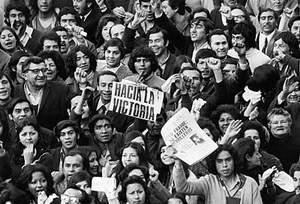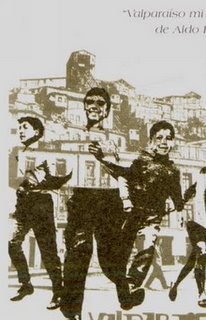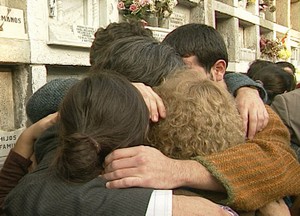 A shout-out to Chilean filmbud Miljenko Skoknic whose site Millions of Images was long on my Evening Class blogroll before the site went down. He also blogs at Dr. Mabuse's Kaleido-Scope and writes for La Fuga. Susan Gerhard at SF360 has astutely signed Miljenko on as an intern and one of his first reports has been on his top four Chilean films—Raúl Ruiz's Palomita Blanca (1973), Aldo Francia's Valparaiso Mi Amor (1969), Patricio Guzman's La Batalla de Chile (1975), and Silvio Caiozzi's Fernando Ha Vuelto (1998).
A shout-out to Chilean filmbud Miljenko Skoknic whose site Millions of Images was long on my Evening Class blogroll before the site went down. He also blogs at Dr. Mabuse's Kaleido-Scope and writes for La Fuga. Susan Gerhard at SF360 has astutely signed Miljenko on as an intern and one of his first reports has been on his top four Chilean films—Raúl Ruiz's Palomita Blanca (1973), Aldo Francia's Valparaiso Mi Amor (1969), Patricio Guzman's La Batalla de Chile (1975), and Silvio Caiozzi's Fernando Ha Vuelto (1998).Palomita Blanca (Little White Dove), adapted from the book by Enrique Lafourcáde, was an early Raúl Ruiz film thought lost only to be eventually discovered in the vaults of Chilefilms. It contained music written and performed by Los Jaivas. It has rarely been written about so it's especially noteworthy that Miljenko has drawn attention to it. René Naranjo has written a piece in Spanish for CivilCinema and Ruiz discussed the project with Benoît Peeters for Rouge, as part of their 2004 annotated filmography on Ruiz in conjunction with a program organized by the Rotterdam International Film Festival—"Raúl Ruiz: An Eternal Wanderer." But that's about it. Greencine's Jonathan Marlow caught up with Ruiz in a crowded café in Rotterdam for an insightful interview (though there is no specific reference to Palomita Blanca) and Girish Shambu—in his inimitable style—has engendered cogent discussion on Ruiz's Poetics of Cinema, likewise eruditely analyzed by Michael Goddard for Senses of Cinema. Though my Greencine rental queue has been padded with all they offer on Ruiz, Palomita Blanca remains evasive, fluttering out of reach. I envy Miljenko his opportunity to have seen the film and, again, appreciate his drawing due notice to its capture of "elusive natural Chilean speech."
 Valparaiso Mi Amor (Valparaiso My Love)—though seen long ago—remains in Miljenko's memory as a "most heartfelt version of neorealism." It's another film rarely written about. Pamela Biénzobas has written a piece in Spanish for Revista de Cine Mabuse. Dan Pavlides has written a lean synopsis for All Movie Guide. He mentions that Aldo Francia was a respected pediatrician who organized the Vina Del Mar Film Festival.
Valparaiso Mi Amor (Valparaiso My Love)—though seen long ago—remains in Miljenko's memory as a "most heartfelt version of neorealism." It's another film rarely written about. Pamela Biénzobas has written a piece in Spanish for Revista de Cine Mabuse. Dan Pavlides has written a lean synopsis for All Movie Guide. He mentions that Aldo Francia was a respected pediatrician who organized the Vina Del Mar Film Festival. Miljenko describes the first installment of Patricio Guzman's La Batalla de Chile (The Battle for Chile) documentary trilogy as "[a] black-and-white, kaleidoscopic recollection of life-segments, interviews, political campaigns, and conspiracies of every level, documenting with wide-eyed precision the calm before the storm that was the 1973 military coup." One bit of IMdb trivia indicates that French filmmaker Chris Marker sent film stock to Guzman to complete this film after the U.S. pulled supplies due to ideological differences. Marker told Guzman that what he was trying to do was insane. It certainly sounds difficult, according to Dennis West who has written about Guzman's methodology of obtaining "actuality footage" rather than relying on archival footage and the more customary compilation techniques that characterize political documentaries. Guzman, a committed Marxist militant, believed in immersing himself in the political fervent he was documenting rather than objectively filming it.
Miljenko describes the first installment of Patricio Guzman's La Batalla de Chile (The Battle for Chile) documentary trilogy as "[a] black-and-white, kaleidoscopic recollection of life-segments, interviews, political campaigns, and conspiracies of every level, documenting with wide-eyed precision the calm before the storm that was the 1973 military coup." One bit of IMdb trivia indicates that French filmmaker Chris Marker sent film stock to Guzman to complete this film after the U.S. pulled supplies due to ideological differences. Marker told Guzman that what he was trying to do was insane. It certainly sounds difficult, according to Dennis West who has written about Guzman's methodology of obtaining "actuality footage" rather than relying on archival footage and the more customary compilation techniques that characterize political documentaries. Guzman, a committed Marxist militant, believed in immersing himself in the political fervent he was documenting rather than objectively filming it.Along with the expected Spanish reviews for CivilCinema and Revista de Cine Mabuse by Christian Ramírez and Jorge Morales, respectively, Paul Bond's English write-up for the World Socialist Web Site provides an equally informed context, detailing Guzman's Q&A responses at a rare London screening at the 1999 Human Rights Watch Film Festival.
 Miljenko's fourth choice—Silvio Caiozzi's Fernando Ha Vuelto (Fernando Is Back)—is also a documentary on Chile's 1973 military coup, rendered this round through the "depleting" story of a 17-year-old detenido desaparecido, one of the many political prisoners detained and "disappeared", whose body is recovered in an illegal grave 20 years after his disappearance, exhumed, identified, and forensically examined. What is revealed is horrific torture—bullet holes and bone fractures—a horrid truth with which his surviving family must reconcile. This documentary short received first prize at the Valdivia Film Festival, the Coral prize for the Best Documentary at the 1999 Festival of Havana, and the OCIC prize granted by the World Catholic Church.
Miljenko's fourth choice—Silvio Caiozzi's Fernando Ha Vuelto (Fernando Is Back)—is also a documentary on Chile's 1973 military coup, rendered this round through the "depleting" story of a 17-year-old detenido desaparecido, one of the many political prisoners detained and "disappeared", whose body is recovered in an illegal grave 20 years after his disappearance, exhumed, identified, and forensically examined. What is revealed is horrific torture—bullet holes and bone fractures—a horrid truth with which his surviving family must reconcile. This documentary short received first prize at the Valdivia Film Festival, the Coral prize for the Best Documentary at the 1999 Festival of Havana, and the OCIC prize granted by the World Catholic Church.I congratulate Miljenko on his SF360 internship and look forward to his continuing contributions to Bay Area film commentary.
Cross-published at Twitch.
No comments:
Post a Comment